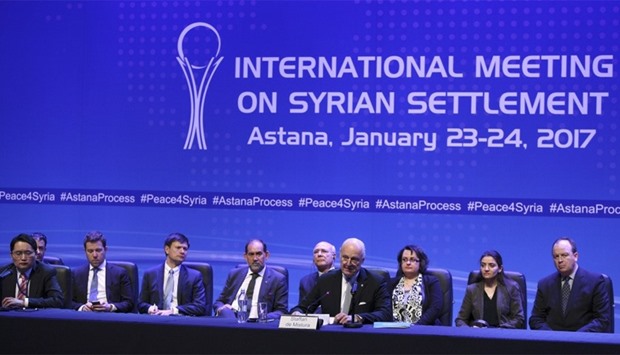The three main sponsors of the negotiations in Astana announced the creation of ‘a trilateral mechanism to observe and ensure full compliance with the ceasefire’ in place since late December.
The three powers also agreed armed rebel groups should take part in a new round of peace talks set to be hosted by the United Nations in Geneva next month.
‘There is no military solution to the Syrian conflict and... it can only be solved through a political process,’ said the final statement by Russia, Iran and Turkey, read out by Kazakh Foreign Minister Kairat Abdrakhmanov.
The two days of meetings in Astana -- which have left the West sidelined -- were mainly a Kremlin initiative and come as Russia has made itself the main powerbroker in Syria with its gamechanging military support for leader Bashar al-Assad.
- 'No notable progress' -
The meeting was expected to see the first face-to-face negotiations between the regime and the armed opposition since Syria's conflict erupted in 2011, but the rebels backed out and mediators were forced to shuttle between the two sides.
Rebel negotiator Mohammad Alloush told AFP the ‘intransigence of Iran and the regime’ was responsible for ‘no notable progress’ in the negotiations.
The latest diplomatic initiative to end the bloodshed in Syria that has cost 310,000 lives comes one month after regime forces, aided by Russia and Iran, dealt a crushing blow to the rebels by retaking full control of the country's second city Aleppo.
A ceasefire brokered by Russia and rebel-backer Turkey has been in place since late December but both rebels and Damascus have complained of repeated violations.
The rebels -- who insisted they would use the Astana talks to push Damascus to respect the truce -- refused direct talks with the regime on Monday because of its continued bombardment and attacks on a flashpoint outside the Syrian capital Damascus.
- 'One goal' -
Regime negotiator Bashar al-Jafaari said after the end of the talks that the meeting ‘succeeded in achieving the goal of consolidating the cessation of hostilities for a fixed period paving the way for dialogue between Syrians.’
There were, however, no concrete details given immediately on the three-way mechanism to strengthen the ceasefire and how it would resolve the thorniest hotspots.
UN Syria envoy Staffan de Mistura said his organisation was ready to assist in developing the mechanism and ‘ensure that it helps strengthen the quality of the ceasefire.’
The rebels have called for a halt to regime attacks on Wadi Barada, an area 15 kilometres (10 miles) northwest of Damascus, but Jafaari insisted operations would continue there.
There was profound rancour and mudslinging between the delegations from Damascus and the rebels.
It also remained to be seen how the sides could patch up differences on the role of the talks' three organisers, Russia, Turkey and Iran.
A member of the rebel delegation told AFP on Monday that the group would agree to have Russia serve as a guarantor of the current ceasefire but not Iran, which controls troops on the ground fighting for Assad.
The Syrian regime, meanwhile, said it would refuse to hold government-level talks with Turkey and sign any document bearing the signature of a Turkish official.
Meanwhile, UN agencies and aid groups appealed for $4.63 billion (4.31 billion euros) in 2017 to help Syrians who have fled their country's war and sought refuge in neighbouring countries.
The appeal is on top of the $3.4 billion that the UN estimates is needed this year for the 13.5 million people still in Syria who have been affected by the conflict.

